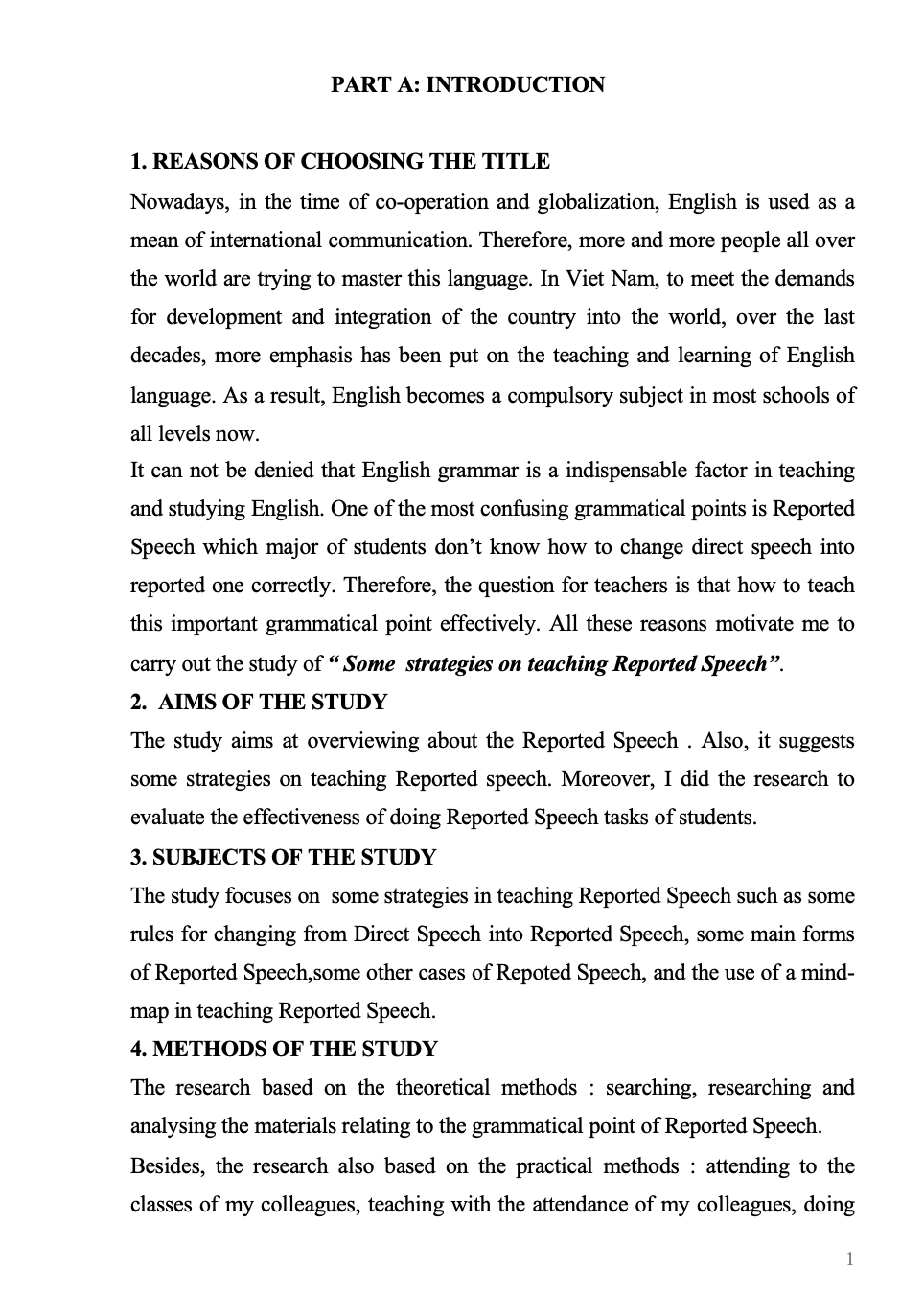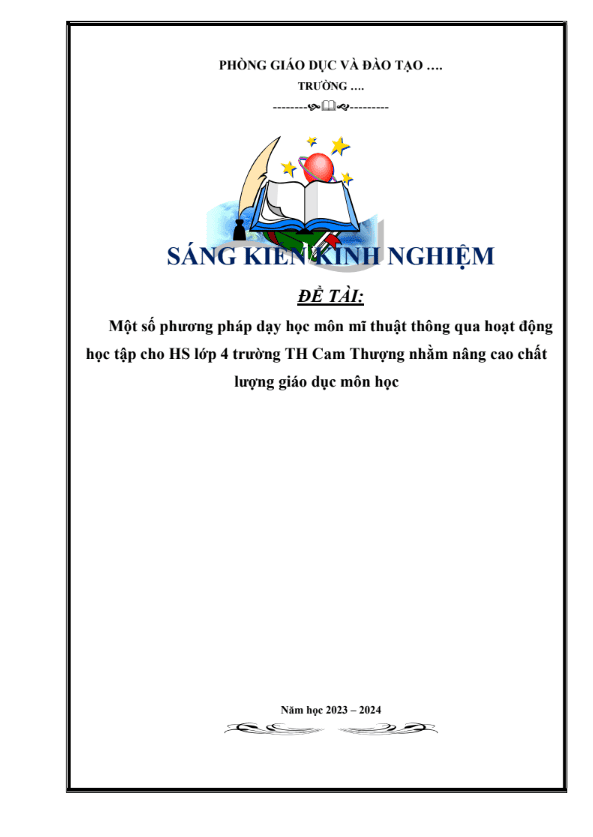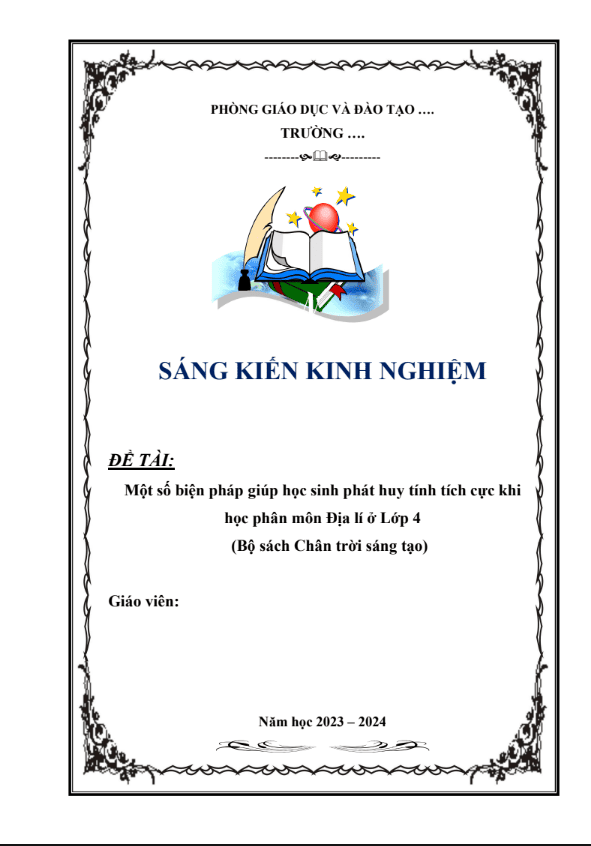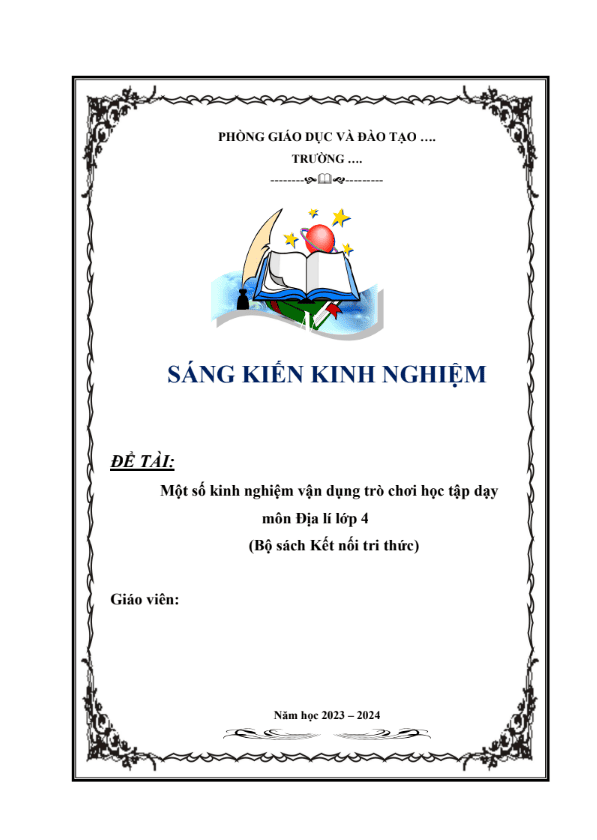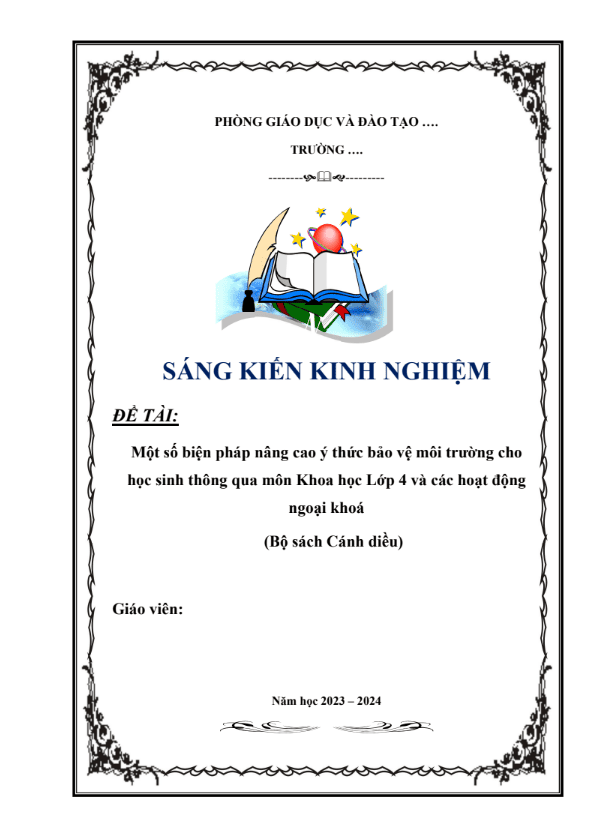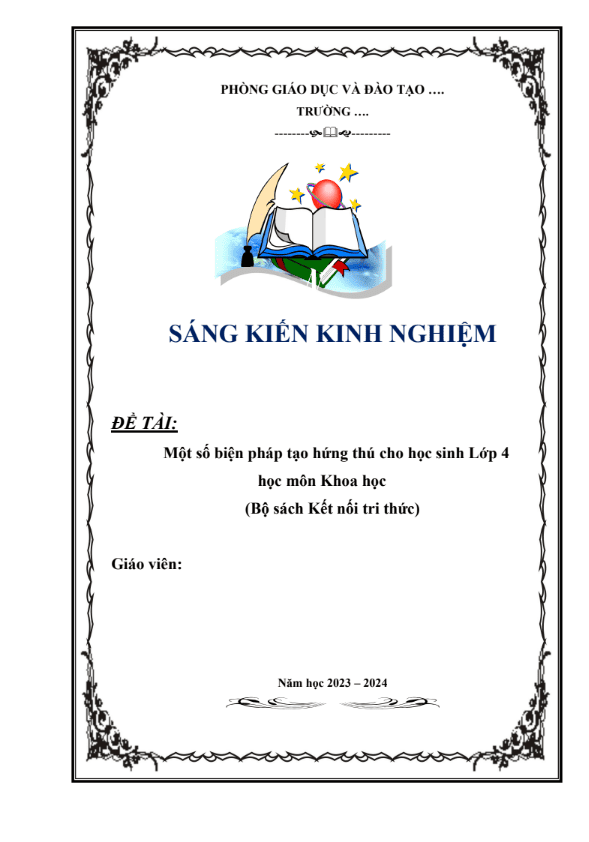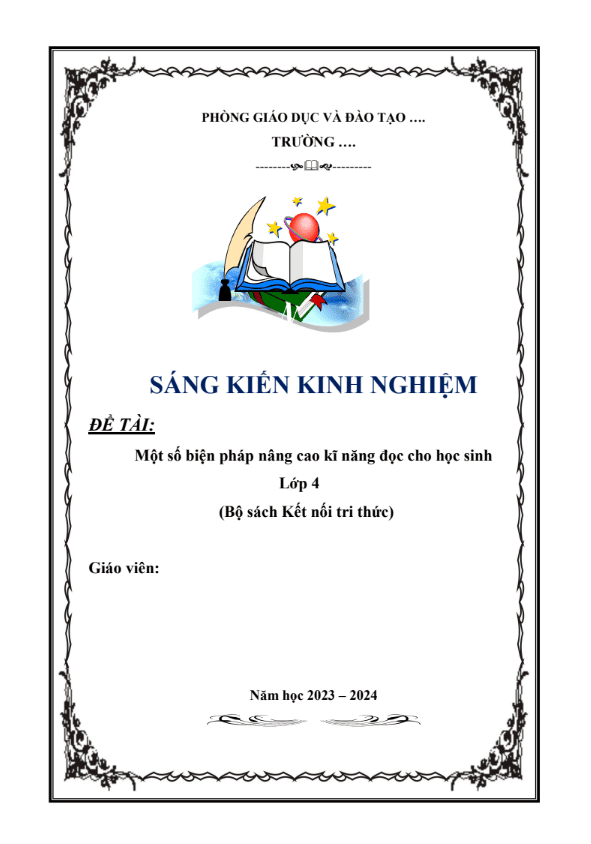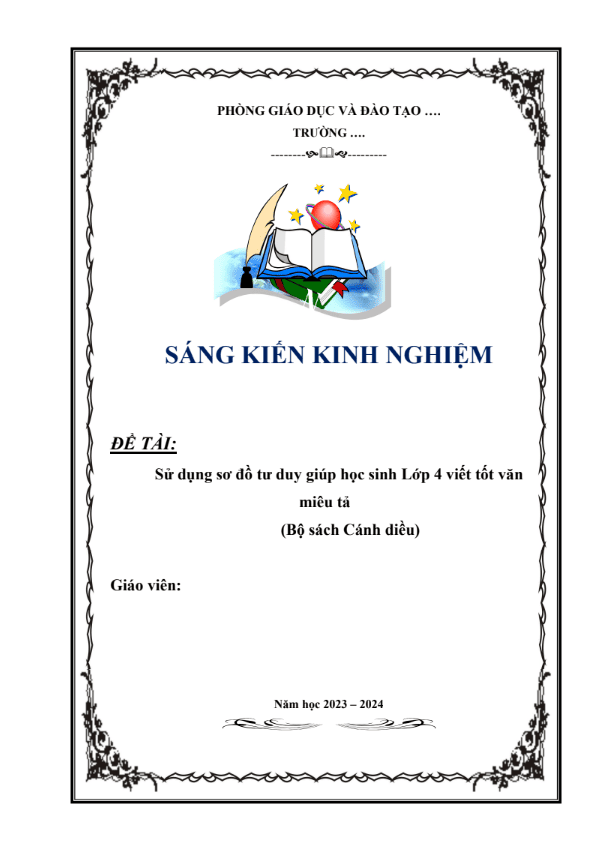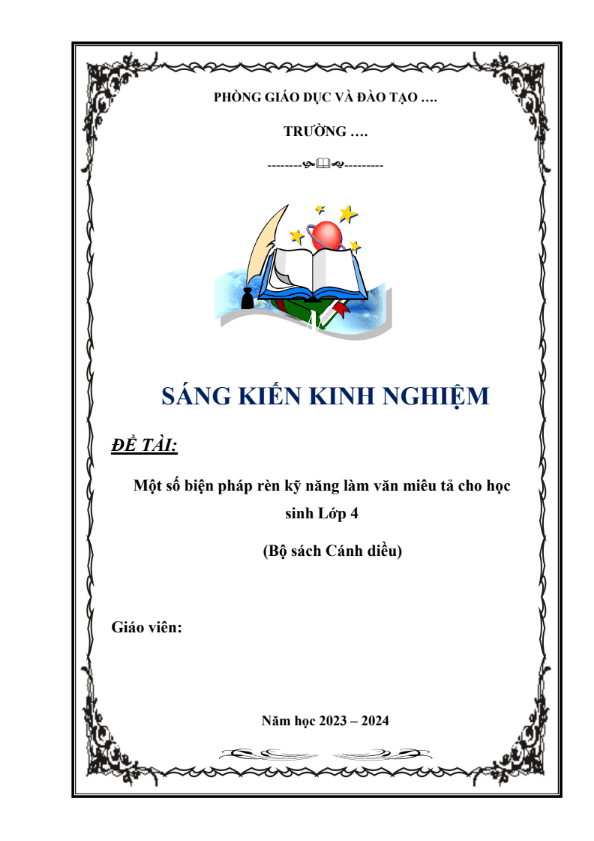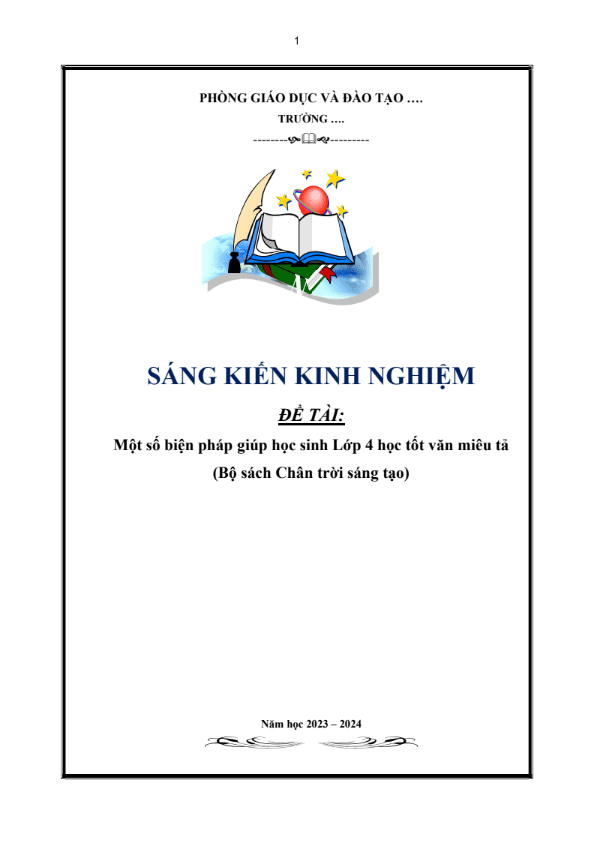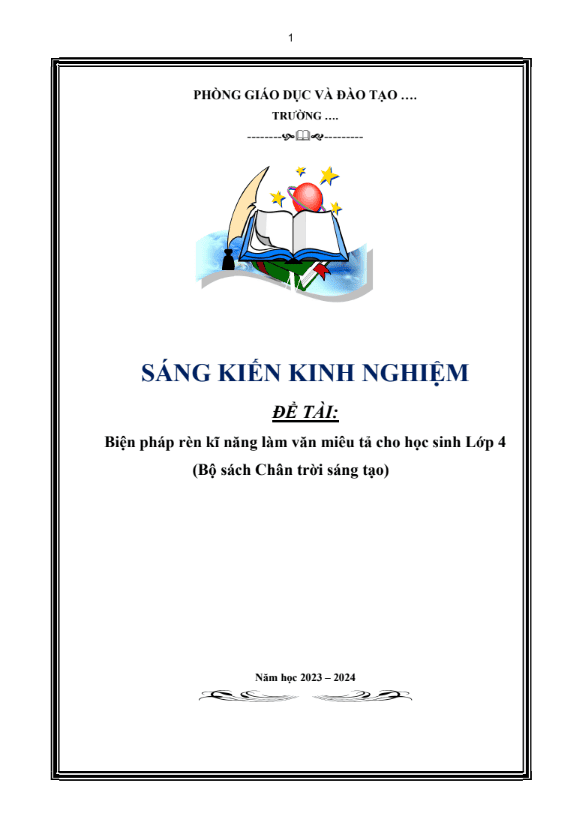SKKN Some strategies on teaching Reported Speech
- Mã tài liệu: BM5090 Copy
| Môn: | Tiếng Anh |
| Lớp: | 5 |
| Bộ sách: | |
| Lượt xem: | 256 |
| Lượt tải: | 6 |
| Số trang: | 28 |
| Tác giả: | Trình Thị Tâm |
| Trình độ chuyên môn: | Thạc sĩ giáo dục |
| Đơn vị công tác: | Trường tiểu học Nam Đàn |
| Năm viết: | 2021-2022 |
| Số trang: | 28 |
| Tác giả: | Trình Thị Tâm |
| Trình độ chuyên môn: | Thạc sĩ giáo dục |
| Đơn vị công tác: | Trường tiểu học Nam Đàn |
| Năm viết: | 2021-2022 |
Sáng kiến kinh nghiệm “SSKKN Some strategies on teaching Reported Speech“ triển khai các biện pháp như sau:
1. Some basic rules of Reported Speech
1.1. Change Pronouns, Possessive Adjectives and Reflexive Pronouns
1.2. Change the tense of the Verb
1.3. Change expressions of time and place ( some adverbs of time & demonstrative)
2. Some main types of Reported Speech
3. Other kinds of Reported Speech
Mô tả sản phẩm
PART A: INTRODUCTION
- REASONS OF CHOOSING THE TITLE
Nowadays, in the time of co-operation and globalization, English is used as a mean of international communication. Therefore, more and more people all over the world are trying to master this language. In Viet Nam, to meet the demands for development and integration of the country into the world, over the last decades, more emphasis has been put on the teaching and learning of English language. As a result, English becomes a compulsory subject in most schools of all levels now.
It can not be denied that English grammar is a indispensable factor in teaching and studying English. One of the most confusing grammatical points is Reported Speech which major of students don’t know how to change direct speech into reported one correctly. Therefore, the question for teachers is that how to teach this important grammatical point effectively. All these reasons motivate me to carry out the study of “ Some strategies on teaching Reported Speech”.
- AIMS OF THE STUDY
The study aims at overviewing about the Reported Speech . Also, it suggests some strategies on teaching Reported speech. Moreover, I did the research to evaluate the effectiveness of doing Reported Speech tasks of students.
- SUBJECTS OF THE STUDY
The study focuses on some strategies in teaching Reported Speech such as some rules for changing from Direct Speech into Reported Speech, some main forms of Reported Speech,some other cases of Repoted Speech, and the use of a mind-map in teaching Reported Speech.
- METHODS OF THE STUDY
The research based on the theoretical methods : searching, researching and analysing the materials relating to the grammatical point of Reported Speech.
Besides, the research also based on the practical methods : attending to the classes of my colleagues, teaching with the attendance of my colleagues, doing some surveys for my students by asking them to do some tasks, homework and tests.
PART B : CONTENTS OF THE STUDY
- THE THEORETICAL BASIC
So far, most of learning English students have troubles with Reported Speech because of its complicated rules and cases. For examples, when changing into Reported Speech, they often confuse with changing Subjects, Verbs, Adverbs of time and place. Moreover, they do not master how many main types of reporting there are and how to change them into Reported Speech. Last but not least, they also do not master what verbs used to report the feeling, attitude of the speaker.
Because of being a teacher of English , I understand that not only students have difficulties in learning Reported Speech but also a lot of teachers face to it in teaching. They have not found the most efficient way to facilitate this grammatical point to students. As a result, how to teach Reported Speech effectively is the important question for all teachers to answer.
- THE SITUATIONS OF THE STUDY
- Advantages
* In term of teachers:
– Most of them are well–qualified and well–competent in their professional teaching.
-They have good ability of applying information technology in teaching English.
– They are always accessed to the latest teaching methods in the workshops.
* In term of students:
Nowadays, most of students aware the importance of English which improves their motivation and passion for studying it.
- Disadvantages
* In term of teachers:
– Many teachers sometimes have problems in teaching some difficult points of the lesson. So, it is not easy for students to understand such lesson. “ Reported Speech” is an example for this.
* In term of students:
– Many students are lack of their attention in the class.
– They are not self-confident enough and always passive in mastering the knowlegde.
– Sometimes, they are lazy to do their homework or extra exercises.
– Some students belong to the poor families that they have no time for studying any more. This problem causes their bad studying result.
– Students are lack of a language environment in which their communicative skills are practised daily. Every thing students learn is most theoretical.
* In term of teaching equipments:
– Equipments used for teaching English are limited and even outdated or not working.
– Many schools have no functional classrooms. This does not meet the demand of learning language in the modern life.
III. THE SOLLUTIONS
- Some basic rules of Reported Speech
Reported Speech is used to report what someone has said. When reporting, the reporter needs to give the exact content, meaning and feeling of a remark or a speech, without necessarily using the speaker’s exact word. Thus, the reporter not only obeys some basic rules but also bases on the context of the situation. These are some basic rules for changing from the direct speech into the indirect speech.
- . Change Pronouns, Possessive Adjectives and Reflexive Pronouns
Pronouns, Possessive Adjectives and Reflexive Pronouns usually change from fist or second to third person, except when the speaker is reporting his own words. For instance:
- a) I said: “ I cut my hand myself ”.
=> I said that I had cut my hand myself.
These are some notes for changing Pronouns and Possessive Adjectives in Reported Speech:
| DIRECT SPEECH | REPORTED SPEECH |
| 1. The first person | It is the person of the speaker in the Direct Speech |
| Ex: a) He said : “ I did it myself ”. => He said that he had done it himself. b) He said : “ We’ll come right away”. => He said (that) they would come right away. | |
| 2. The second person | It is the person of the listener in the Direct Speech |
| Ex: a) He said to her : “ You are a hard-working student”. => He told her (that) she was a hard-working student.b) “ You have to do your homework yourselves ”, Mrs Lien said to her students. => Mrs Lien told her students (that) they had to do their homework themselves. | |
| 3. The third person | It stays the same as in the Direct Speech |
| Ex: a) She said : “ They have to go to the market and cook dinner themselves”. => She said (that) they had to go to the market and cook dinner themselves.b) He said : “ She will never return here one more time”.=> He said (that) she would never return ther one more time. | |
1.2. Change the tense of the Verb
Reported Speech is usually introduced by a verb in the past tense. Verbs in the Direct Speech have then to be changed into a corresponding past tense. The changes are shown in the following table.
| DIRECT SPEECH | REPORTED SPEECH | |
| 1. Present Simple | Past Simple | |
| Ex: She said : “ I am a new student”. => She said (that) she was a new student. | ||
| 2. Present Progressive | Past Progressive | |
| Ex: “ We are having dinner”, he said. => He said (that) they were having dinner. | ||
| 3. Present Perfect / Past Simple | Present Perfect | |
Ex: a) “ I have never seen a such fat man”, Mai said to Tam.
b) “ He sold his apartment”, she said. => She said that he had sold his apartment. |
||
| 4. Present Perfect Progressive / Past Progressive | Present Perfect Progressive | |
| Ex: a) He said: “ I’ve been waiting for ages” => He said that he had been waiting for ages. b) “ We were having dinner when your mother came”, Lan said to me. => Lan told me that they had been having dinner when my mother had come. | ||
| 5. Past Perfect | Past Perfect | |
| Ex: a) She said: “ He had been to school but he had learnt nothing here”. => She said that he had been to school but he had learnt nothing there. | ||
| 6. Future | Future in the Past | |
Ex: a) Jane said: “ I will / shall be 20 on my next birthday”.
b) He said: “ I will / shall be using the car myself on the 24th” => He said that he would be using the car himself on the 24th . |
||
|
Condition in the Past | |
Ex: a) He said : “ If the bus is late again, I will take a taxi to work”.
b) He said: “ I’ll be glad if she is here in an hour”. => He said that he would be glad if she was there in an hour. ( NOT: He said that he would be glad if she were there in an hour.) |
||
* Notes:
– If Direct Speech uses the Past Simple which contains a certain period of time, or an unchangeable event, it will not change into the Past Perfect in Reported Speech.
Ex: 1. My teacher said: “ The Second World War ended in 1945”.
=> My teacher said that the Second World War ended in 1945.
- She said : “ I decided not to buy the house because it was on the
main road”.
=> She said that she had decided not to buy the house because it
was on the main road.
– In theory, the past progressive tense in Direct Speech changes into the Past Perfect Progressive. However, this change only takes place when it refers to a completed action. In practice, the Past Progressive Tense in Direct Speech usually remains in Reported Speech.
Ex: He said: “ When I saw them they were playing tennis”.
=> He said that when he saw them they were playing tennis.
– In term of Conditional Sentences in Reported Speech, there is no tense changes in Type 2 and Type 3.
Ex: a) “ If I had a permit I could get a job”, he said.
=> He said that if he had a permit he could get a job.
- b) Mary said: “ If I had finished the composition earlier, I would
have handed it in on time”.
=> Mary said that if she had finished the composition earlier, she
would have handed it in on time.
– Unreal past tenses after wish, would rather/ sooner and it is time do not change:
Ex: “We wish we didn’t have to take exam,” said the children.
=> The children said they wished they didn’t have to take exams.
1.3. Change expressions of time and place ( some adverbs of time & demonstrative)
Adverbs and adverbial phrases of time and demonstrative change as follow:
| Direct Speech | Reported speech |
| herethisthesenow todayyesterdaythe day before yesterdaytomorrowthe day after tomorrownext week/ next month/ next year, ect.last week/ last month, ect.Two years ago | therethatthosethen, at that timethat daythe day beforetwo days beforethe next day / the following dayin two days’ timethe following week/ month / year, ect.The previous week/ month/ etc.Two years before |
* Note:
– If the speech is made and reported on the same day, these time changes are not necessary.
Ex: At breakfast this morning my father said: “ I’ll be very busy today”
=> At breakfast this morning my father said that he would be very busy today.
TÀI LIỆU LIÊN QUAN
- 0
- 155
- 1
- [product_views]
- 6
- 163
- 2
- [product_views]
- 8
- 188
- 3
- [product_views]
- 3
- 125
- 4
- [product_views]
- 5
- 118
- 5
- [product_views]
- 8
- 110
- 6
- [product_views]
- 7
- 116
- 7
- [product_views]
- 0
- 188
- 8
- [product_views]
- 5
- 192
- 9
- [product_views]
- 1
- 187
- 10
- [product_views]

